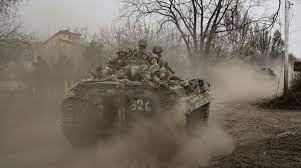MOSCOW (Reuters): Russia’s defense ministry said on Friday that the use of depleted uranium shells in Ukraine would harm Ukrainian troops, the wider population and negatively affect the country’s agriculture sector for decades or even centuries.
Russia has reacted furiously to plans outlined by Britain earlier this week to send shells containing depleted uranium to Ukraine.
London says they are a conventional form of ammunition, but President Vladimir Putin said the move showed NATO members were sending weapons with a “nuclear component” to Kyiv.
“The West is well aware of the negative consequences of using depleted uranium ammunition,” Igor Kirillov, head of the Nuclear, Biological and Chemical Protection Forces of Russia’s defense ministry said in a statement on Friday.
He said data on the use of depleted uranium by the United States and is allies in the Balkans and Iraq showed serious and lasting negative impacts on local populations and the environment.
Ukraine’s agricultural industry could suffer “for decades, if not centuries, into the future,” he said.
Critics of the use of depleted uranium, such as the International Coalition to Ban Uranium Weapons, say the dust created by such weapons can be breathed in while munitions which miss their target can poison groundwater and soil.
Countries such as the United States and Britain say depleted uranium is a good tool for destroying a modern tank. Britain says in guidance that inhaling enough depleted uranium dust to cause injury would be difficult.
Russia’s defense ministry on Friday disputed those claims and said the use of depleted uranium shells, compared to Tungsten-based ammunition, “has no significant advantage” on the battlefield.
The Royal Society said in a report in 2002 that the risks to the kidney and other organs from the use of depleted uranium munitions are very low for most soldiers in the battlefield and for those living in the conflict area.
Russia is also known to produce uranium weapons along with around 20 other countries, according to the International Coalition to Ban Uranium Weapons.







